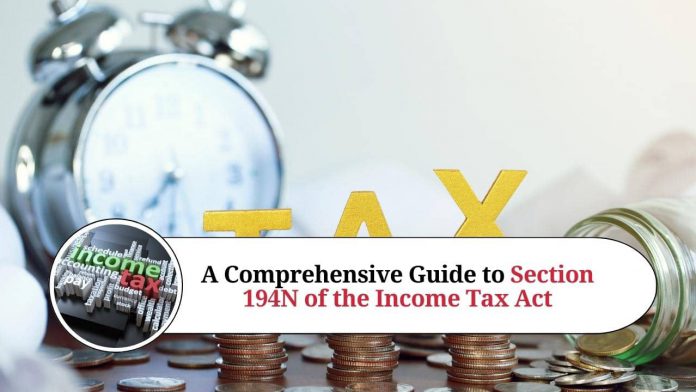Section 194N of the Income Tax Act is a recent provision introduced by the Finance Act, 2019 that has significant implications for individuals who withdraw large sums of cash from their bank accounts. In this blog post, we will delve deeper into the nuances of this section to help individuals understand its provisions and comply with its requirements.
Applicability of Section 194N
Section 194N applies to any cash withdrawal made by an individual from his/her bank account(s), where the total amount of cash withdrawal exceeds Rs. 1 crore in a financial year. The provision is applicable to all banks, including cooperative banks and post offices.
TDS rate under Section 194N
The TDS rate under Section 194N is 2% on the amount of cash withdrawal exceeding Rs. 1 crore in a financial year. It is important to note that this TDS rate is applicable on the gross amount of cash withdrawal and not just the amount exceeding Rs. 1 crore.
Threshold limit for TDS under Section 194N
The threshold limit for TDS under Section 194N is Rs. 1 crore in a financial year. If the total amount of cash withdrawal made by an individual from his/her bank account(s) is less than Rs. 1 crore in a financial year, TDS is not required to be deducted. However, if the amount exceeds this limit, TDS must be deducted on the entire amount, and not just the amount exceeding the threshold limit.
Compliance requirements under Section 194N
The compliance requirements under Section 194N include obtaining a Tax Deduction and Collection Account Number (TAN) and deducting TDS at the applicable rate. The TDS deducted must be deposited with the government by the 7th of the following month. The deductor is also required to file TDS returns in Form 26QC quarterly. It is important to note that non-compliance with these requirements can lead to penalties and interest charges.
Exemptions from TDS under Section 194N
There are no exemptions available from TDS under Section 194N.
Penalties for non-compliance with Section 194N
Non-compliance with Section 194N can lead to penalties and interest charges. If the payer fails to deduct TDS or deducts TDS at a lower rate than prescribed, then he/she will be liable to pay interest at the rate of 1% per month or part of the month on the amount of TDS not deducted. Additionally, a penalty may be imposed for non-compliance.
Impact of Section 194N on the economy
Section 194N was introduced with the intention to promote digital transactions and discourage cash transactions. The provision aims to curb the circulation of black money in the economy by discouraging individuals from withdrawing large sums of cash from their bank accounts. The introduction of Section 194N has also resulted in an increase in the use of digital payment methods.
Impact of Section 194N on banks
Section 194N has a significant impact on banks, as it requires them to comply with the provisions of the section and ensure that TDS is deducted on cash withdrawals exceeding Rs. 1 crore in a financial year. Banks must also report these transactions to the government, which requires additional administrative effort and cost.
Impact of Section 194N on taxpayers
Section 194N has a direct impact on taxpayers who withdraw large sums of cash from their bank accounts. Individuals must be aware of the provisions of this section and comply with its requirements to avoid penalties and interest charges. Moreover, individuals must also explore alternative payment modes like digital payments and cheques to avoid TDS under Section 194N.
Exemptions from TDS under Section 194N
There are no exemptions available from TDS under Section 194N. However, the provision does not apply to withdrawals made by the following entities:
- The government and its agencies
- Banking companies, post offices, and cooperative banks
- Business correspondents of banking companies and cooperative banks
- White-label ATM operators
- Other entities notified by the government
Conclusion
Section 194N is an important provision under the Income Tax Act that applies to individuals who withdraw large sums of cash from their bank accounts. Individuals must comply with the provisions of this section to avoid penalties and interest charges. Understanding the nuances of this provision can help individuals ensure compliance and avoid unnecessary costs. Moreover, individuals must also explore alternative payment modes like digital payments and cheques to avoid TDS under Section 194N.
Other Useful Links:
Frequently Asked Questions (FAQs) about Section 194N
Q.1) Is Section 194N applicable to all bank account holders?
Yes, Section 194N is applicable to all bank account holders, including individuals, HUFs, firms, companies, and trusts.
Q.2) What is the rate of TDS under Section 194N?
The rate of TDS under Section 194N is 2% on cash withdrawals exceeding Rs. 1 crore in a financial year.
Q.3) Is there any threshold for TDS under Section 194N?
Yes, the threshold for TDS under Section 194N is Rs. 1 crore in a financial year.
Q.4) What is the due date for depositing TDS under Section 194N?
The TDS deducted under Section 194N must be deposited with the government by the 7th of the following month.
Q.5) Can the TDS deducted under Section 194N be claimed as a refund?
Yes, the TDS deducted under Section 194N can be claimed as a refund while filing the income tax return.
Q.6) Is there any exemption from TDS under Section 194N?
No, there are no exemptions available from TDS under Section 194N. However, withdrawals made by certain entities, such as the government, banking companies, and post offices, are exempt from the provisions of Section 194N.
Q.7) What are the penalties for non-compliance with Section 194N?
Non-compliance with Section 194N can attract penalties and interest charges. If the TDS is not deducted, the payer is liable to pay interest at the rate of 1% per month from the due date of deduction to the actual date of deduction. Moreover, the payer can also face penalty proceedings under Section 271C of the Income Tax Act.




















